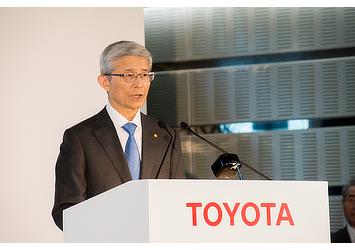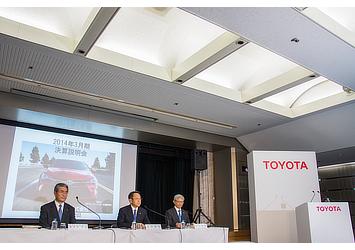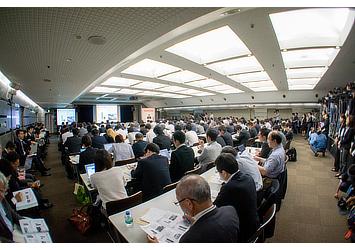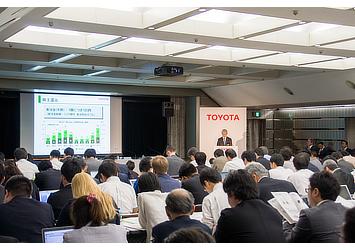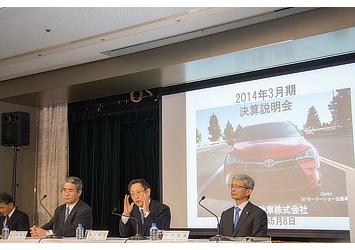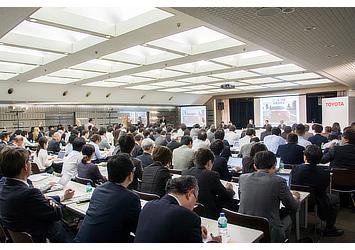May. 08, 2014
Toyota Motor Corporation Announces
Financial Results for Fiscal Year Ended March 31, 2014
(All consolidated financial information has been prepared in accordance with U.S. generally accepted accounting principles)
Toyota City, Japan, May 8, 2014—Toyota Motor Corporation (TMC) today announces its financial results for the fiscal year ended March 31, 2014.
On a consolidated basis, net revenues for the period totaled 25.69 trillion yen, an increase of 16.4 percent compared to the previous fiscal year. Operating income increased from 1.32 trillion yen to 2.29 trillion yen, an increase of 971.2 billion yen, while income before income taxes1 was 2.44 trillion yen. Net income2 increased from 962.1 billion yen to 1.82 trillion yen.
Major factors contributing to the increase in operating income included currency fluctuations of 900.0 billion yen, cost reduction efforts of 290.0 billion yen and marketing activities of 180.0 billion yen.
Consolidated vehicle sales totaled 9,116,033 units, an increase of 245,369 units compared to the previous fiscal year.
Commenting on the results, TMC President Akio Toyoda said: “Our consolidated operating income increased due to increased vehicle sales mainly in Japan and North America and to group-wide cost reduction activities.”
In Japan, vehicle sales totaled 2,365,410 units, an increase of 86,614 units. Operating income from Japanese operations increased by 933.8 billion yen to 1.51 trillion yen.
In North America, vehicle sales totaled 2,529,398 units, an increase of 60,594 units. Operating income increased by 104.1 billion yen to 326.0 billion yen, including a loss of 15.5 billion yen due to valuation gains/losses from interest rate swaps. Operating income, excluding the impact of valuation gains/losses from interest rate swaps, increased by 152.7 billion yen to 341.5 billion yen.
In Europe, vehicle sales totaled 844,003 units, an increase of 44,918 units, while operating income increased by 31.7 billion yen to 58.2 billion yen.
In Asia, vehicle sales totaled 1,608,355 units, a decrease of 75,223 units, while operating income increased by 19.6 billion yen to 395.7 billion yen.
In other regions (including Central and South America, Oceania, Africa and the Middle East), vehicle sales totaled 1,768,867 units, an increase of 128,466 units, while operating income decreased by 91.1 billion yen to 42.5 billion yen.
In the financial services segment, operating income decreased by 20.9 billion yen to 294.8 billion yen, including a loss of 22.0 billion yen of valuation gains/losses from interest rate swaps. Excluding valuation gains/losses, operating income increased by 30.7 billion yen to 316.9 billion yen.
TMC estimates that consolidated vehicles sales for the fiscal year ending March 31, 2015 to be 9.1 million units.
In addition, TMC forecasts consolidated net revenue of 25.7 trillion yen, operating income of 2.3 trillion yen and net income of 1.78 trillion yen for the fiscal year ending March 31, 2015, based on an exchange rate of 100 yen to the U.S. dollar and 140 yen to the euro.
TMC also announces a year-end dividend of 100 yen per share, to be proposed at the general shareholders meeting in June.
1Income before income taxes and equity in earnings of affiliated companies
2Net income attributable to Toyota Motor Corporation
(Please see attached information for details on financial results. Further information is also available at www.toyota-global.com)
Cautionary Statement with Respect to Forward-Looking Statements
This release contains forward-looking statements that reflect Toyota's plans and expectations. These forward-looking statements are not guarantees of future performance and involve known and unknown risks, uncertainties and other factors that may cause Toyota's actual results, performance, achievements or financial position to be materially different from any future results, performance, achievements or financial position expressed or implied by these forward-looking statements. These factors include, but are not limited to: (i) changes in economic conditions and market demand affecting, and the competitive environment in, the automotive markets in Japan, North America, Europe, Asia and other markets in which Toyota operates; (ii) fluctuations in currency exchange rates, particularly with respect to the value of the Japanese yen, the U.S. dollar, the euro, the Australian dollar, the Russian ruble, the Canadian dollar and the British pound, and interest rates fluctuations; (iii) changes in funding environment in financial markets and increased competition in the financial services industry; (iv) Toyota’s ability to market and distribute effectively; (v) Toyota’s ability to realize production efficiencies and to implement capital expenditures at the levels and times planned by management; (vi) changes in the laws, regulations and government policies in the markets in which Toyota operates that affect Toyota’s automotive operations, particularly laws, regulations and government policies relating to vehicle safety including remedial measures such as recalls, trade, environmental protection, vehicle emissions and vehicle fuel economy, as well as changes in laws, regulations and government policies that affect Toyota’s other operations, including the outcome of current and future litigation and other legal proceedings, government proceedings and investigations; (vii) political and economic instability in the markets in which Toyota operates; (viii) Toyota’s ability to timely develop and achieve market acceptance of new products that meet customer demand; (ix) any damage to Toyota’s brand image; (x) Toyota’s reliance on various suppliers for the provision of supplies; (xi) increases in prices of raw materials; (xii) Toyota’s reliance on various digital and information technologies; (xiii) fuel shortages or interruptions in electricity, transportation systems, labor strikes, work stoppages or other interruptions to, or difficulties in, the employment of labor in the major markets where Toyota purchases materials, components and supplies for the production of its products or where its products are produced, distributed or sold; and (xiv) the impact of natural calamities including the negative effect on Toyota’s vehicle production and sales.
A discussion of these and other factors which may affect Toyota's actual results, performance, achievements or financial position is contained in Toyota's annual report on Form 20-F, which is on file with the United States Securities and Exchange Commission.





